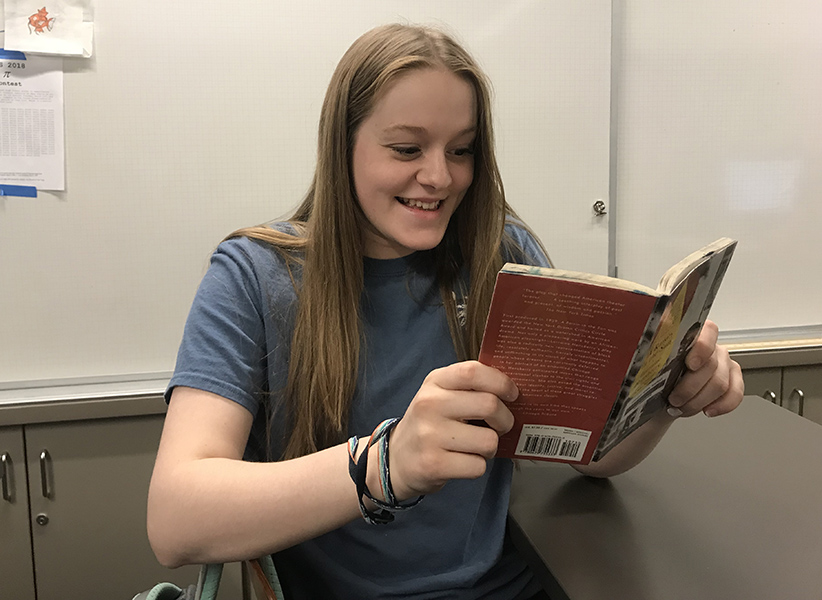To Read Or Not To Read
REQUIRED READING Junior Kassidy Cameron is currently reading A Raisin in the Sun for class. She enjoys reading, and does it often for both school and her own personal enjoyment. “Books are a great way to pass time,” Cameron says.
May 3, 2018
Students at Issaquah High are no strangers to reading. From news articles on our phones to tweets, text posts, and Instagram captions, American teens are reading more than they ever have before. This reading, however, rarely comes from books. This inconsistency is corroborated by a recent New York Times study that claims that only 45 percent of 17-year-olds read a couple of books a year. The majority of teens read even fewer.
While Issaquah students (mostly) read required books in English class,that is where the reading of paper books stops. About reading, senior Kehui Zheng says, “It’s not a relaxing thing for me when I’m choosing how to spend my free time.” The number of teens reading books for the heck of it has dramatically dropped, taking with it books sales and thus sinking book selling businesses. The dying out of bibliophiles has gone so far as to being reflected in poor stock prices for companies like Barnes & Noble who are currently threatening a nationwide closedown of all their stores.
As children, many Issaquah students like sophomore Luciana Nardi enjoyed Dr. Seuss books as an escape from reality. Before the grip of easy-access technology and the siren call of social media it was easy for individuals to lose themselves in a novel and ignore the outside world. As students have moved from sporadically calling their friends from ancient landlines to frequently texting at the speed of light the number of teen bibliophiles has significantly dropped. Many teens plead being incapable of separating from their phones. The lack of connection to the outside world through the internet and social media invokes Fear of Missing Out (FOMO) and makes some teens too anxious to put down their phones in exchange for a book.
Books used to be a go-to for individuals who wanted to get away from their lives and enter a world in which their reality did not matter; however, with the increase in technology that escape is no longer necessary. Instead, video games with virtual reality and simulations provide the same escape without the loss of connectivity the books force the reader to undergo.
Some book lovers have taken the change in stride. With the rise of technology came the ability to read, write, and share books with bibliophiles around the world. Large Instagram communities of bookstagrammers, individuals who share pictures of books, are not only flourishing, but growing and becoming a market for popular merchandise. Additionally, apps like BookShout allow readers to purchase and read books on their phones, allowing them to stay connected and share their favorite quotes with their friends.
Others like Zheng believe that, “We read less books because more and more careers…do not really need a lot of reading.” As society has advanced, there has been less emphasis on reading as STEM and related jobs are promoted and valued. Many students like freshman Gavin Phillips blame technology, citing it as “the reason why students read less.” With this switch many struggling authors have joined the STEM field, writing scripts for video games as narrative design artists. This is one of the few changes that have resulted from the lack of reading teens.
Reading is important because it benefits society. A well-read society understands clever references, has a wide vocabulary, and is able to navigate a variety of situations. Zheng says, “Not a lot of people know general things that they should know.” Books can allow readers to thrust themselves into hypothetical situations and propose solutions to conflicts in society. Junior Cole Price says books are good for “creativity and thinking about how others feel in certain situations.” Having an above average vocabulary is helpful not only to individuals trying to come across as intellectuals but also to students taking standardized tests. In addition, with current meme culture, catching subtle references is key to achieving the status of meme lord which can only be gained by being well-versed in both literature and the dark depths of the internet. While it may not seem so, there are many hidden benefits to being well-read.
Accompanying the rise of the internet is the increase in the creation and use of slang. With so many new words and acronyms cropping up on social media, it can be difficult for some to cut their vocabulary down in order to read a book. Additionally, with an increase in apps and platforms like Archive of Our Own (AO3), Wattpad, and LiveJournal, people have foregone books in favor of free novels written by their peers that they can read while still being connected online.
Sure many adults argue that reading is on its way out and that books are a dead investment, but at the end of the day, society is still reading more than ever and the importance of books is widely acknowledged.



